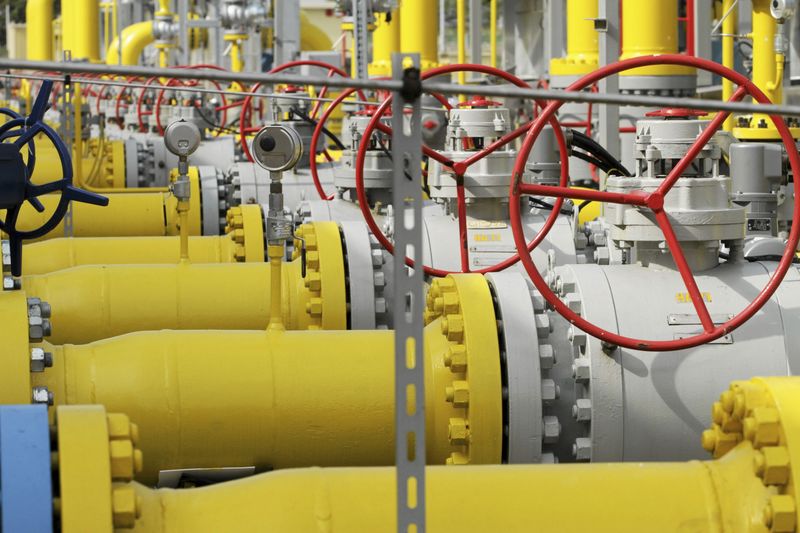By Geoffrey Smith
Investing.com -- Benchmark prices for natural gas in Europe shot higher on Wednesday before paring gains as Russian gas monopoly confirmed that it has stopped supplies to Poland and Bulgaria.
It's the first time that Russia has interrupted supplies to EU members in over 40 years of shipping natural gas, and is a decisive break with the country's previous insistence that it is a reliable energy supplier.
By 2:45 AM ET (0645 GMT), the Dutch TTF Natural Gas Futures contract for May delivery was up 12.5% on the day at 116.20 euros a megawatt-hour, having opened at a four-month high of 125 euros. The contract had risen over 10% already on Tuesday as Russia first announced its intention to stop supplying, citing the two countries' refusal to pay in rubles rather than euros and dollars. Russia unilaterally rewrote the terms of its export contracts after the West imposed financial sanctions on Russia's central bank, effectively freezing much of its foreign reserves.
The move is a major escalation of the economic conflict that has broken out in parallel to the military one between Russia and Ukraine, a retaliation for the West's increasing willingness to ship arms to Ukraine. It also comes only days after both sides appeared to expand their war aims, with Russia declaring it seeks control of all of southern Ukraine and U.S. Defense Secretary Lloyd Austin saying that the U.S. wanted to see Russia "weakened" and unable to project force into other parts of eastern Europe.
"The announcement by Gazprom that it is unilaterally stopping delivery of gas to customers in Europe is yet another attempt by Russia to use gas as an instrument of blackmail," said European Commission President Ursula von der Leyen in a statement. She added that Europe is "prepared for this scenario", pointing to efforts in recent months to secure alternative supplies. Poland imported 53% of its natural gas from Russia in the first quarter, but aims to commission a new pipeline from Norway before next winter. Bulgaria is in a more difficult position, taking over 90% of its gas supplies from Russia.
Prices are still well below where they were at the start of the conflict, when they spiked as high as 345 EUR/MWh, thanks to the fact that the winter heating season is now over. However, many countries in Europe remain largely reliant on Russian gas in the short term, notably Germany, which has refused to embargo Russian energy imports due to the impact it would have on its economy. Germany has also dragged its heels on sending Ukraine weaponry, although it made a significant shift in its position on Tuesday in approving the shipment of Gepard anti-aircraft tanks.
"Russia needs the money, ruble or not, and the EU needs the gas, so look for a compromise," said Ole Hansen, head of commodities research at Saxo Bank, via Twitter. "If not, an escalation with supplies to Germany being cut would trigger rationing and sharply higher prices."
Germany has already enacted the first part of a three-part plan to conserve gas supplies, the final stage of which envisages rationing to industry.
Newswires quoted Bulgarian Energy Minister Alexander Nikolov as saying that the country had already paid in full for its supplies in April, and that Gazprom (MCX:GAZP) was consequently breaching its contract.
The news also had a knock-on effect in currency and stock markets, pushing the euro to a new five-year low against the dollar and sending the STOXX 600 down 0.5% to a six-week low in early trading in Europe.
(CORRECTION: The first version of this story misstated one of the countries targeted by Russia)
